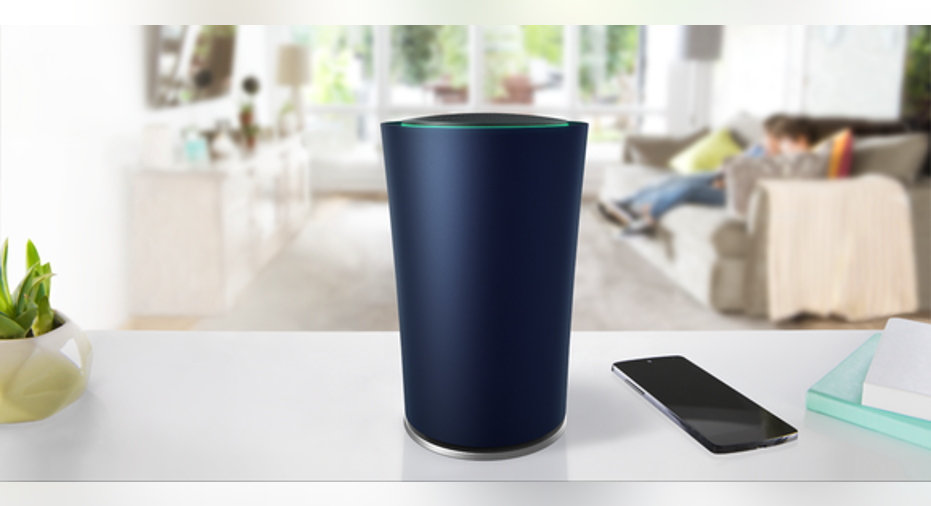Can Google's Home Speaker Leapfrog Amazon's Echo?

Source: Google.
"OK, Google. What does Amazon.com's Echo do that you can't?"
Not much. At least that's what Alphabet's management wants you to think.
The tech giant demonstrated a range of new hardware during last week's Google I/O keynote address, including its widely expected smart speaker, called Home. The device hopes to rival Amazon's in-home tower in the budding race for control of the smart home.
(Google's) Home is where the heart is
Alphabet's growing family of hardware products gained a number of new members last week, including Google Home. Formerly operating under the codename Chirp, Google Home appears to both exceed and miss analyst expectations.
The device doesn't ship until the fall, but Alphabet is already talking a big game about Home's capabilities as a virtual assistant. In comparing Home to Amazon's Echo, Mario Queiroz, Google's VP of product management, noted in an interview with The Verge: "We're competing feature for feature in most of the areas. And in the areas that really matter to the consumer, we're going to do a better job."
One example is listening to music, which Alphabet views as a primary use for the device. Queiroz claims that Home's speaker quality trumps that of Echo, which is hard to determine until users can test the device. However, Home does beat Echo in its flexibility. Thanks to its use of Alphabet's Cast standard, which allows easy device-to-device communication, the Home speaker is said to work well with other Google Home devices and speakers throughout a user's home.
In terms of similarities, Home and Echo both prominently feature each company's respective virtual assistants. It's hard to say at this point how the two devices compare, but Echo probably trumps Home in its ability to play nice with other third-party devices. Alphabet reportedly decided to limit Home's API to only communicate with other Cast-enabled devices, like Chromecast. On the other hand, Echo can connect with, and operate a wide range of smart light bulbs, power outlets, thermostats, universal remotes, and more. Alphabet claims it selected its strategy to focus Home's efforts almost exclusively on optimizing its virtual assistant.
Just the beginning
That decision reflects the emphasis tech companies like Alphabet, Amazon, Apple, and Microsoft place on AI. According to reports, Google views voice assistants like the one powering Home as the future of search, where users will interface with so-called virtual "bots" instead of entering queries into a search bar.
Viewed this way, putting a priority on perfecting its virtual assistant seems reasonable. Though the company has sown seeds that it hopes will grow into large businesses, search still produces nearly all of Alphabet's revenues and profits. So for Google's money machine to continue humming well into the future, the company needs to produce a leading virtual assistant.
Image source: Google.
Yet there are risks to this approach. Failing to open its platform to third-party apps may hinder Google's efforts to gain a foothold in the smart home, which figures to be another major growth market for tech companies. Granted, Google has other means of establishing its presence in the smart home, but failing to fully integrate features from Google's OnHub and Home seems to leave something on the table.
Leaving an opening for another company to gain market share of the smart-home OS risks Alphabet's ability to secure a place for its profit-driving services in the living room of the future. It could be that Google expects the advantages it enjoys in mobile -- things like favor among developers, its leading apps, and more -- to ensure it a prominent spot in the smart home no matter what.
However, Amazon stunned many in the industry when it launched the Echo last year, and Amazon's competitive threat to Google will be a persistent long-term subplot within tech. So with this long-term growth market in its infancy, investors will want to watch the coming moves from the likes of Alphabet, Amazon, Apple, and more.
The article Can Google's Home Speaker Leapfrog Amazon's Echo? originally appeared on Fool.com.
Suzanne Frey, an executive at Alphabet, is a member of The Motley Fool's board of directors. Andrew Tonner owns shares of Apple. The Motley Fool owns shares of and recommends Alphabet (A shares), Alphabet (C shares), Amazon.com, and Apple. The Motley Fool owns shares of Microsoft and has the following options: long January 2018 $90 calls on Apple and short January 2018 $95 calls on Apple. Try any of our Foolish newsletter services free for 30 days. We Fools may not all hold the same opinions, but we all believe that considering a diverse range of insights makes us better investors. The Motley Fool has a disclosure policy.
Copyright 1995 - 2016 The Motley Fool, LLC. All rights reserved. The Motley Fool has a disclosure policy.



















